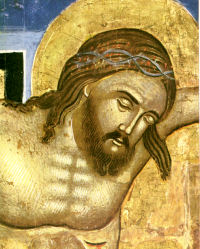» Enjoy our Liturgical Seasons series of e-books!
Sin is the great barrier between God and man. Sin, caused the beginning of hell and made devils of the fallen angels. Sin drove Adam and Eve out of their paradise and took away their marvelous gifts of grace and of freedom from sickness and death. But only in the sufferings and death of the God-man do we see what God really thinks of sin. Before sin there existed no sickness, no death, no hatred, no discord, no ugliness. Every suffering and disorder in the world is a reflection of sin. Every Mass, continuing the atoning Sacrifice of Calvary, is God's mercy to sinners throughout the world. Every sacrament is God's means of restoring all things in Christ. — Daily Missal of the Mystical Body
According to the 1962 Missal of Bl. John XXIII the Extraordinary Form of the Roman Rite, today is the feast of St. Benedict, "Father of Western Monasticism," twin brother of St. Scholastica. His feast in the Ordinary Form of the Roman Rite is celebrated on July 11.
Meditation - On the Compassion of Some Women of Jerusalem
A goodly number of the women of Jerusalem (not disciples of Jesus) met this saddest of funeral processions. No doubt their weeping and sobbing and loud wailing, however sincere, was not in real accord with the sorrow that was straining Jesus' heart to the breaking point-His sorrow, namely, over their refusal to accept the truth of His Messiahship and of His supreme royalty as the promised Christ and Savior. Still, the heart of Jesus was deeply affected by the sympathy of these women. Contrasted with all else that was poured into His ears, it was very acceptable and was gratefully received.
But what lastingly gives this incident its chief significance is the fact that, even here in His greatest misery, Jesus is thinking predominantly of the doom of the Holy City and its temple, now practically sealed. Evidently His heart is aching at the vision of the horrors that will soon overtake it and the whole Jewish race, for its criminal blindness to His divine credentials and its obstinate refusal to profit by His teaching and His Precious Blood. For the days are near, when the barren among the Jewish women will be called blessed; when death, sudden and terrible though it be, will seem preferable to life. Try, therefore, to look deep into Jesus' Sacred Heart in its very keen sympathy for these women, and especially for their children. For of the children here present in the procession, or carried in the arms of their mothers, many no doubt were to be witnesses and victims of the abomination of desolation coming upon Jerusalem not forty years hence (Luke 19:41-44)
Excerpted from Our Way to the Father by Leo M. Krenz, S.J.

The station church at Rome is in the church of St. Apollinaris, who was a disciple of St. Peter, and afterwards bishop of Ravenna. He was martyred. The church was founded in the early Middle Ages, probably in the 7th century.

Thursday of the Fifth Week of Lent
Station with Sant'Apollinare in Campo Marzio or Sant'Apollinare alle Terme (St. Apollinaris at the Baths):
The Station in Rome is in the church of St. Apollinaris, who was a disciple of St. Peter, and afterwards bishop of Ravenna. He was martyred. The church was founded in the early Middle Ages, probably in the 7th century. Since 1990, the basilica has been the chapel of the Pontifical University of the Holy Cross, entrusted to Opus Dei.
For more on Sant'Apollinare in Campo Marzio, see:
For further information on the Station Churches, see The Stational Church.








